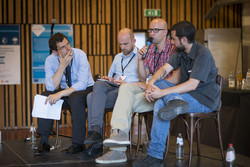P2PVALUE project drives peer production forward
You may never have heard of ‘commons based peer production’ (CBPP) but you have probably heard of Linux, Wikipedia and Open Street Map which all came about thanks to the CBPP model. Peer production like this allows for the creative energy of large numbers of citizens to be coordinated, usually through a digital platform, outside of the parameters of traditional organisations resulting in the ‘public provision of commons resources’. Put simply, it uses collaborative efforts between people to build something which anyone can continue to develop and use. As this approach to production becomes increasingly widespread, it is important to investigate what factors and tools can encourage it to thrive and how sustainable CBPP projects are. And this is exactly what the EU-funded P2PVALUE project is doing. Speaking at the CAPS2015 conference(opens in new window) David Rozas from the University of Surrey and Samer Hassan from the Complutense University of Madrid explained how the project team has been working together to map how peer production projects are spreading and mixing, to investigate the conditions which favour collaborative creation projects and to explore the value of such projects. The results of this research have informed, among other things, the development of a software which offers some of the features of Google Drive – an open source digital platform based on decentralized architecture. Addressing the audience at CAPS2015, Hassan noted, ‘Google wants us to use its services and also offers tools to use Google servers. However then Google has your data and there are privacy and transparency issues. We have built a tool with some features in common with Google Drive but it is decentralised and open source.’ The tool can be used for real-time collaboration, not only by developers but more generally by the different members within CBPP communities. Another outcome of the project is a directory of information on existing CBPP communities(opens in new window), together with their main characteristics. The directory, which currently features 375 cases of CBPP, provides freely available data in open formats. Anyone involved in peer to peer collaboration is encouraged to explore and participate by searching for and editing existing cases or adding new cases themselves. The idea is to provide a rich resource for research in this emerging field. Developed using Drupal, the technology behind the directory is robust but also flexible enough to, for example, manage different categories of users – authenticated users, moderators and administrators. The data, under a public domain license, can also be accessed in different formats – such as JSON or CSV. In line with the CBPP approach, the tool has been developed in a collaborative and open manner. Events such as P2P data jams, hackathons and workshops provide the community with the opportunity to play with the data and contribute to the project. The platform continues to evolve and Rozas hopes that the directory keeps evolving even after the P2Pvalue project has concluded. He noted, ‘Our ideas for future work include the automatic collection of data from the platform and other sources, data visualisation and more mechanisms to increase users' contributions.’ Finally, the consortium is also working on the theory and policy aspects of CBPP to develop a theory on the approach and determine best practices for communities as well as developing a series of policy recommendations for public administrations to encourage CBPP-driven social innovation. For further information, please visit: P2PVALUE http://p2pvalue.eu/(opens in new window)
Countries
United Kingdom



